

For most company founders, preparing a business for launch can take months or years. How are startup teams at UNC-Chapel Hill and UNC Health condensing that timeline down to days and weeks – and building digital health ventures that are primed for venture capital investments?

After he woke up with blurry vision, Eddie made his way to the hospital, where he was in for a surprise. He was suffering from a critical medical condition – invasive sinusitis – and required emergency surgery. At the UNC Health emergency department, he received the right medical diagnosis, a prompt, life-saving procedure, IV antibiotics and antifungal medications. “Eddie was unfortunately told postoperatively that he needed to stay in the hospital for ongoing medical care,” said Dr. Meera Udayakumar, MD, a hospitalist at UNC Health.
According to Udayakumar, the recommendation for in-patient care that Eddie received is common. But that doesn’t mean it’s always the best course of action for every patient, she said. After all, there are risks inherent to brick-and-mortar hospitalization. For patients, these include deconditioning, hospital-acquired infections, and time spent away from the comfort of home. Extra time spent at the hospital was particularly disruptive for Eddie since he was the primary caregiver for an ailing family member. For medical providers, in-hospital care is extremely expensive, and overcrowding means that sometimes there aren’t enough beds for patients who desperately need to be admitted. The bottom line: too many people are stuck in hospital beds when they don’t need to be.
“Wouldn’t it be wonderful if there was a different option for patients, an option that was more convenient? Where the clinical outcomes are as good or perhaps better?” asked Udayakumar. “Fortunately for us, that alternative actually exists today. Hospitalization can occur in a patient’s home.”
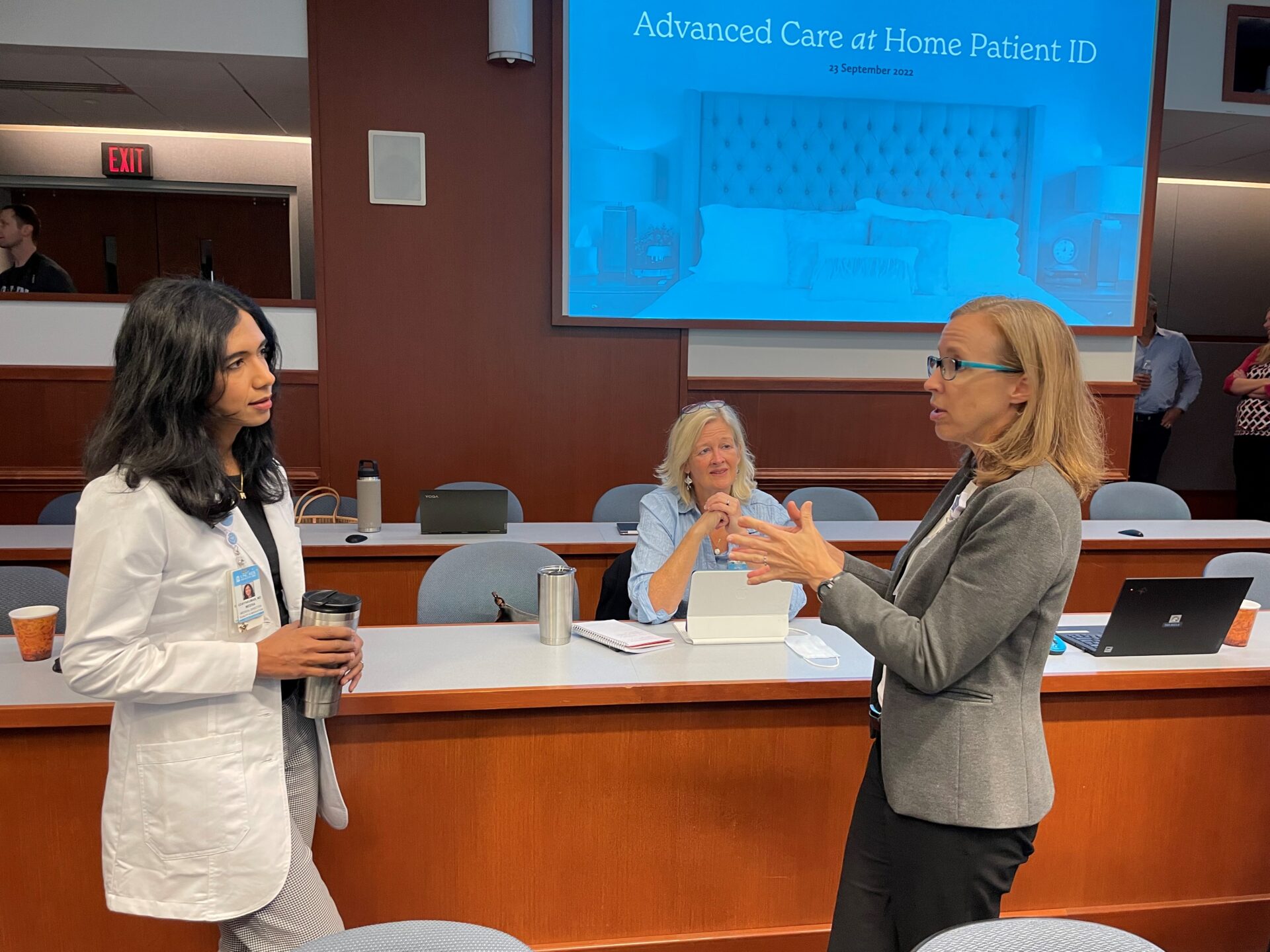
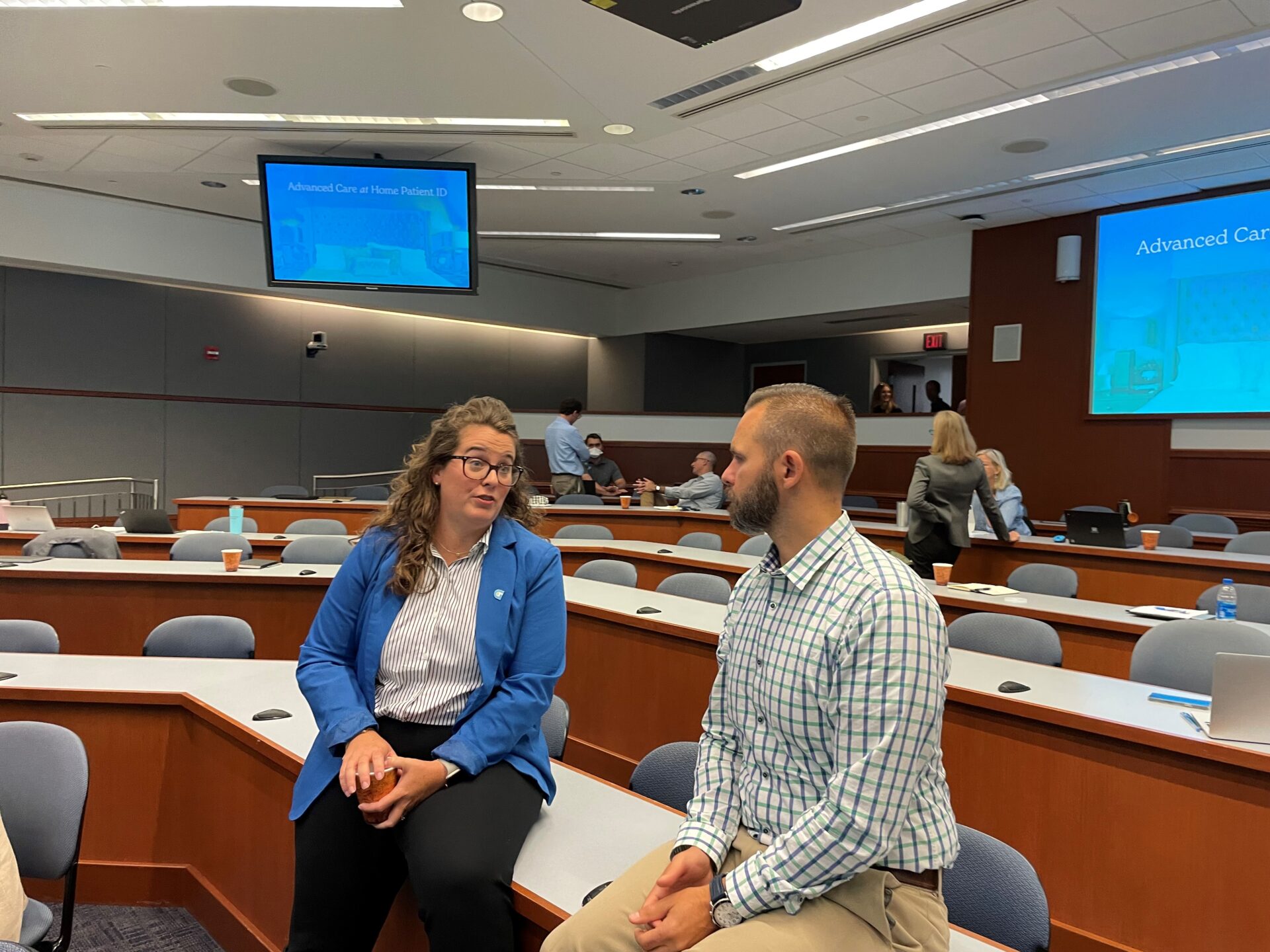
This is the vision painted by Udayakumar during her startup pitch at Sprint Week, a forcing function for launching new startups, hosted by First In Venture Studio. Her team – called ReloCare – participated in Sprint Week to help launch a startup based on a data-driven technology that makes it easier for providers to quickly identify and confidently decide which patients actually need to be admitted to the hospital and which ones can safely receive hospital-grade care at home. The digital tool was developed and is currently in use at UNC Health. The tool is currently slated for launch. It will pilot its solution at both UNC Hospitals and hospital systems nationwide.
The First In Venture Studio is a partnership between UNC-Chapel Hill, the Eshelman Institute for Innovation, UNC Health and industry partner High Alpha Innovation, a leading venture builder headquartered in Indianapolis that partners with large corporations and universities. The studio – which aims to launch more than 10 digital health startups over the next three years – facilitates an extensive 16-week program over the summer to identify and conduct detailed diligence on promising ideas and technologies developed by faculty, staff and providers from the university and health system. Each year at the conclusion of the program, the venture studio hosts Sprint Week at the university. Sprint Week is a three-and-a-half-day, all-hands-on-deck experience during which the two top teams from the sprint gather with High Alpha Innovation and entrepreneurial experts to further transform their venture concepts into digital health startups that are well positioned for the market. The venture studio is focused on the rapidly growing digital health market and is an innovative approach for expanding the significant impact made by the more than 550 active UNC startups, which generated more than 100,000 jobs and $18.3 billion in revenue in 2022.
In fall 2022, two teams of faculty and medical practitioners spent their time at Sprint Week huddled in the Eshelman School of Pharmacy, working side-by-side with seasoned entrepreneurs, venture creation experts from High Alpha Innovation, and industry strategists from UNC Health. The goal? Rapidly transforming venture concepts into digital health ventures that are primed for investment.
During the week, the venture teams spent long days – and extended evenings – hunkered down in work sessions to conduct market research, make customer discovery calls, and build business models. All the work is done to prepare for pitch day, the week’s culminating event, when the two teams present their business cases to a group of investors assembled by First In Venture Studio. The week is designed as a forcing function for startup launch: its compressed timeline enables teams to work smart and fast, further developing their venture concepts and preparing their pitches.
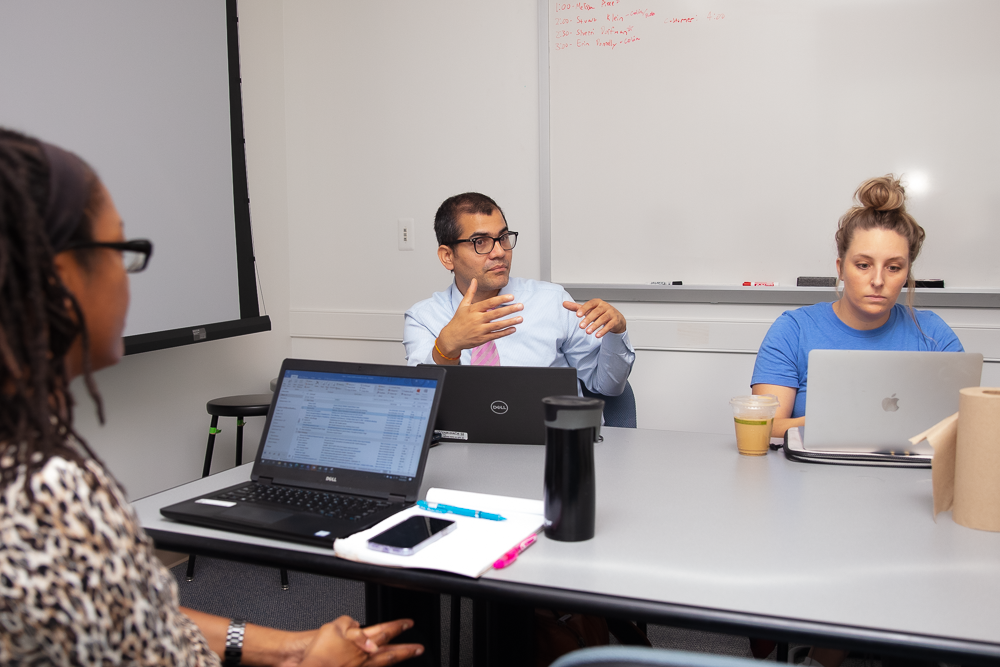
“The venture studio investment committee will decide if it wants to launch a startup and invest up to a million dollars in pre-seed capital in these startups,” said Bob Dieterle, managing director of First In Venture Studio at the Eshelman Institute for Innovation and entrepreneur-in-residence with Innovate Carolina. “This isn’t a competition, and it’s not a winner with a prize. These are venture concepts looking to convince the investment committee that they’re worthy of investment and spun out as tangible, venture-backable startups.”
Of 43 teams identified and supported this year by the venture studio, two concepts earned spots to participate in Sprint Week: Udayakumar’s ReloCare team and an additional team led by Johna Register-Mihalik, PhD, an associate professor of exercise and sport science at UNC-Chapel Hill.
“Sprint Week has been an incredibly collaborative experience,” said Register-Mihalik. “As a researcher, sometimes it takes a long time to move forward on any process, and I think in two days I’ve learned more about the potential market and environment for our strategy than I would’ve learned in six months in any other process.”
“We need to move products and ideas forward quickly so that they can get to the market and help our patients and providers faster,” she said. “Working with the sprint team this week has been eye-opening in terms of hearing all of the ideas on market strategy, how we might develop the product, and how we might develop the cost structure within the current market.”
How did each team end up at sprint week? Dieterle and Carol Lewis, vice president of UNC Health Enterprises, lead teams that collaborate year-round with health researchers and practitioners like Udayakumar and Register-Mihalik who are working on innovations – ideas, side projects, pieces of intellectual property, or existing tools – that have potential to turn into successful businesses. During a three-month period over the summer led by High Alpha Innovation, the venture studio evaluated and performed diligence on 43 teams, using a core set of questions to guide their review. Those questions help determine if there is a clear job to be done, whether there is a feasible solution, the market potential, and if there is a strong business model. The studio team prioritizes the most promising concepts through multiple selection rounds. “We evaluate the venture concepts through a venture capital lens,” said Dieterle, who notes that the concepts moving through the venture studio model are expected to attract bigger markets and have more disruptive, defensible technologies than startups that aren’t ready for venture capital investment. “We have a high bar for all the venture concepts, and we look to determine which ones are the most attractive and feasible.”
By mid-August, the studio prioritized the two teams that were most ready to participate in Sprint Week – and also enlisted the help of student interns from Kenan-Flagler Business School’s MBA program to work with High Alpha Innovation in preparing the teams for the final leg of the sprint. By the end of the summer, the venture teams adopted trademark-ready brands for each team, validated business concepts and market feasibility, and completed customer discovery calls to gather as much external insight as possible heading into the week.
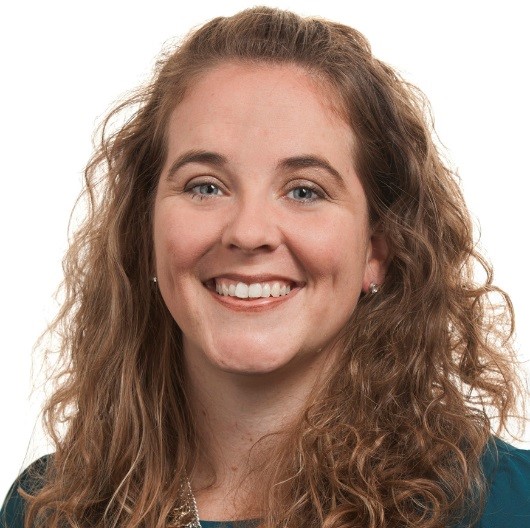

For the teams selected, Sprint Week is a rigorous, roll-up-your-sleeves experience focused on one outcome: beginning to build advantaged, investment-ready ventures. Over the course of several days, the two teams worked long hours in groups of 10 to 12 people each. The teams consisted of faculty and physician principal investigators, High Alpha Innovation’s venture-building experts, innovation practitioners from the UNC core team, designers, and student interns from Kenan-Flagler Business School.
“In many ways, the teams formed over the weeks accelerate the scale for the startup’s initial founding teams – even though they haven’t formally launched and are building out the initial scaffolding of the company and preparing to convince the investment committee that this company is ready to launch,” Dieterle said. “In the huddle rooms, one person is the leader who I view as an interim CEO, while others work as the chief product officer, revenue director, sales exec, brand steward and other roles. When it comes time to recruit and hire those actual positions, we already have tremendous advantage. ”
“This is not a deck-building exercise. We are making startups, and we are going to invite real people to quit their paying jobs to become entrepreneurs and founders of the businesses that we’re starting,” said Rob Kimball, director at High Alpha Innovation, who notes that the teams must work hard and fast to make tangible progress, smart decisions, and compelling investor pitches in just a few days.
Kimball says that while the teams spend a lot of time huddled together, much of their effort involves pushing themselves outside the conference rooms they’re working in to talk with potential customers out in the world. The goal is to get external validation and make sure that they’re solving problems that people face in real life. “We do a lot of work to understand problems, put solutions against those problems – and figure out the nuts-and bolts-mechanics of what these businesses will look like: how they will compete, how they will price and how they will grow,” he said.
Udayakumar’s ReloCare team used a divide-and-conquer strategy to work efficiently against the condensed timeline. “We met as a group at the beginning of the day and decided how to break this down into more manageable sections, with each group working on different angles and then coming together later,” she explained. “The team did a tremendous amount of work, and it was very impressive how much expertise they gained throughout the week.”
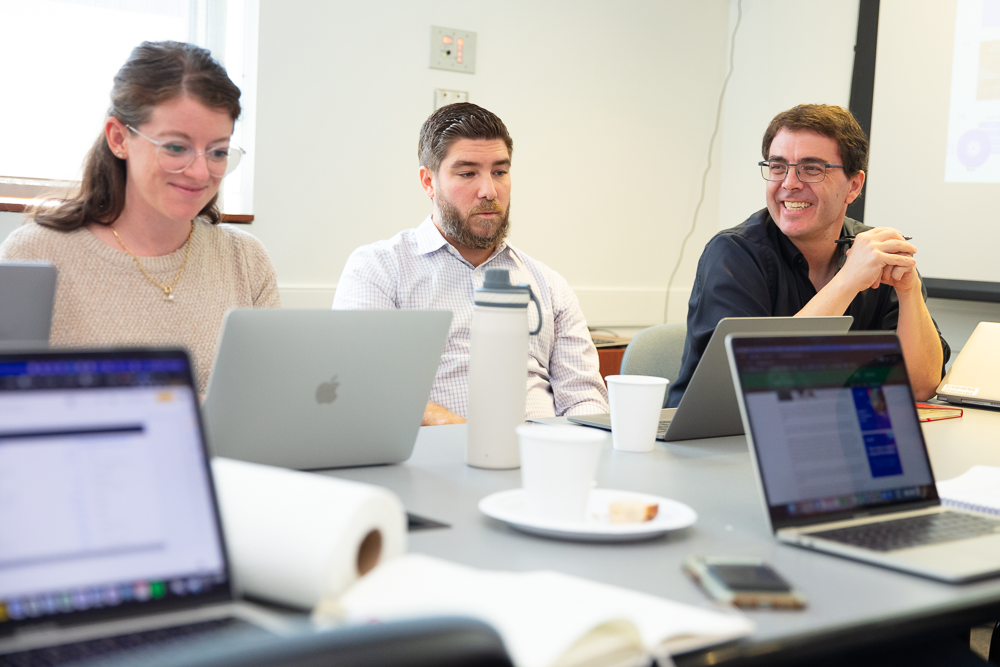
The ReloCare team conducted nearly 20 customer interviews, including medical directors, physicians, nurses, and digital health experts from hospitals, health systems, insurers and tech companies. “The market research confirmed that the initial problem we set out to address is universal,” said Udayakumar. “So, it was good to hear that UNC Health is in strong company – we’re not the only ones facing this problem – and there is significant interest in developing a solution.”
“We’ve done a lot of customer calls to validate that the problem that we think is a problem is actually a problem for others, and that the solution that we’re proposing has value for potential customers,” said Lesley Hall, director of UNC Health Enterprises, who spent the week supporting the ReloCare team. “When this tool launches into a business, part of its success will be determined by its financial performance. So we’ve done a lot of research to identify the total addressable market and how much of that market we can capture with our solution.”
Both teams also focused on quickly putting themselves in the customer’s shoes. “We’re trying to identify the market size, the types of customers, who our initial customers should be, how they would use our products, and even the algorithms behind how the product works,” said Adam Kiefer, PhD, assistant professor of exercise and sport science, who worked with Register-Mihalik’s team. “So you’re condensing what would normally take quite a bit of time – weeks or months – into a three-and-a-half day sprint to have a pitch ready to try to obtain investment funds for the company.”
The immediate goal for teams participating in Sprint Week is securing funding from the venture studio investment committee. For the ReloCare team, the process has already resulted in a pre-seed investment from the committee. This significant funding creates immense momentum for the venture, which now becomes a real company.
“Our ReloCare team will continue with our work. We’re using this predictive tool today, will continue to do so, and will refine it further,” said Udayakumar. “I am certain there will be growing interest from other institutions expanding into the hospital-at-home space and more demand for this type of tool.”
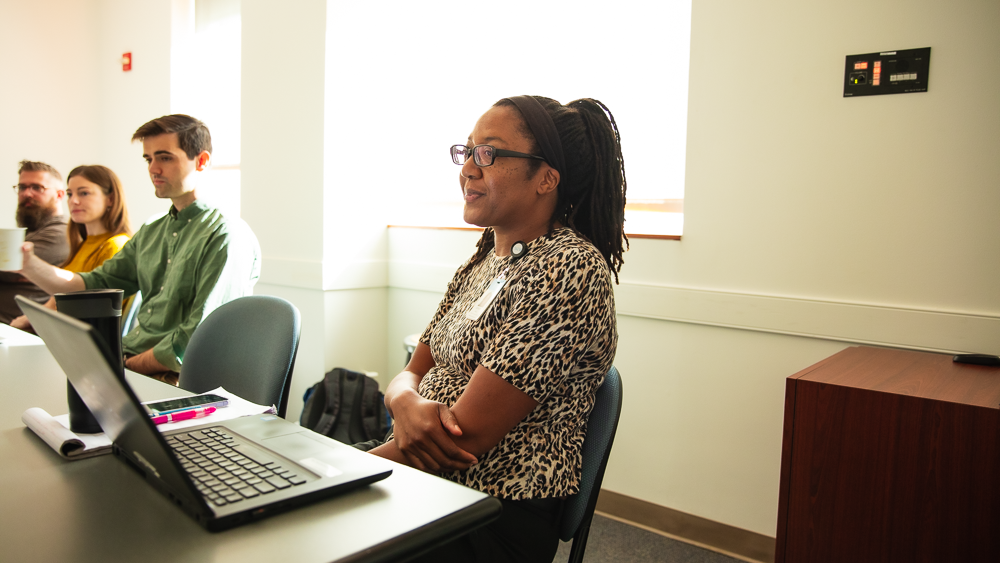

But just because a venture didn’t receive an investment on its first attempt – or get invited to participate in Sprint Week – doesn’t mean the road ends. Quite the contrary, says Kimball.
“The cool thing about building a relationship with organizations like UNC and UNC Health is that these are not one-time games,” said Kimball. “The things that we didn’t choose for the sprint this time – they don’t go away forever. We get to build conviction and ideas about what we wish we understood about those problems, and maybe we get to revisit them in the future. Every time we turn the crank, we get a little bit smarter.”
Beyond seeking investments, researchers and physicians also find value in the entrepreneurial mindset that they hone during the week.
“One of the things we like to do is to make sure that research applications get out to the people who need them most. What Sprint Week allows us to do is to get behind the scenes into that process to think more like a business,” said Kiefer. “There are a lot of advantages to that: one is that we’re trying to launch a startup company. But as an academic, I can also take the things that I learned here back to my laboratory to conduct more efficient processes, onboard people more efficiently and think big picture in ways that will scale to these kinds of opportunities.”